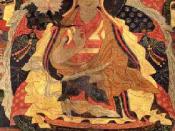Seven Years in Tibet is orientalism which focusing on Tibetan religion and history. The orientalism plays out in opposites rescue paradigm, western authority over the East, and the justification of that authority. The movie recounts of the story of Heinrich Harrer's years in Tibet and actually parallels the history of Tibet-focused orientalism. When Harrer first enters the country, he exhibits the behavior of a commanding father to the Tibetans childlike state. The Tibetans are depicted as innocent primitives without social graces, guile, or education. Harrer is an Aryan, hardly tolerant of having to exist in the primitive society, his only other option the Indian prison from which he just escaped. The play of opposites here is that of classic orientalism: Tibet is scorned as only an intermediate means to salvation for the West, and in Harrer's case, as a temporary obstacle to finding final escape back to Austria. As the story progresses, Harrer takes control and seemingly teaches the Tibetans all they need to know when he befriends the boy Dalai Lama and becomes his educator, teaching him about the outside world and the wonders and wars it holds.
Throughout the movie, though it is found that Harrer's teachings are vital for the regent's preparation against the Chinese invasion. For short periods of time, he rescues the Dalai Lama from the confines of the Lhasa Potala and the primitive religion that has imprisoned him there.
Communist China invaded Tibet in the 1950's after World War II ended. The Chinese government believed that its claim to Tibet to be valid for three reasons. The Chinese government believed it had the right to the Tibetan territory left from the thirteenth century, when Tibet and China were incorporated into Kublai Khan's empires. The government also claims that the union formed at the...


